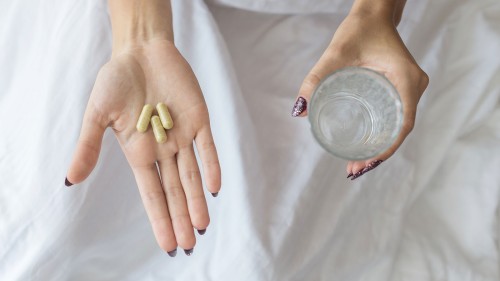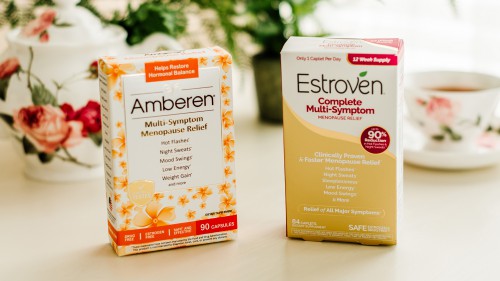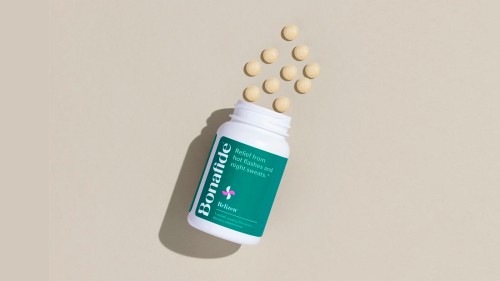A Dietitian Recommends Best Foods to Eat and Avoid During Menopause to Feel Your Best
Last Updated on September 28, 2023
Medically Reviewed by Anthony Dugarte, MD
There are many ways to support your hormones by changing your diet during menopause. Including some foods while avoiding others, is a great place to start improving your health.


Menopause is a natural transitional period in a woman’s life. It is a time that many women may be dreading due to fear of gaining weight or experiencing unpleasant symptoms. But it doesn’t have to be so difficult.
The definition of menopause is the time that marks the end of a woman’s menstrual cycle.
Menopause officially starts 12 months after a woman’s last period and continues through the perimenopause stage for several years. The average age for the onset of menopause is around 50 years old. (1)
Hormone therapy may be the first thing that comes to mind in regards to easing uncomfortable symptoms and body changes. However, a healthy diet may also ease these symptoms and offer a more natural approach to symptom management.
Following a specific menopause diet can help you feel your best during these years of transition. On the menopause diet, there are certain foods that help with menopause naturally and other foods that should be avoided. The goal is to reduce symptoms and help regulate hormone levels.
Best Foods During Menopause to Reduce Symptoms
Recent research demonstrates that certain dietary patterns can reduce menopausal symptoms. (2)
The diet for menopause is an anti-inflammatory diet that not only emphasizes certain foods but also discourages others.
Fruits and Vegetables
Eating a diet rich in fruits and vegetables is always a good idea during any stage of life.
In fact, the USDA’s Dietary Guidelines recommend filling half your plate with fruits and vegetables. (3)
This is even more so during menopause, and there is research to back this up.
Fruits and vegetables are naturally low in calories but high in nutrients. With this, they can support a healthy weight and provide much-needed energy during a time of transition.
In 2012, a large study was conducted involving over 17,000 women. Those who ate more fruits, vegetables, and fiber experienced a 19% reduction in hot flashes compared to the control group. (4)
Another more recent 2020 study found similar benefits, especially with leafy green vegetables such as kale and spinach, broccoli, and berries. (5)
Both fruits and vegetables are high in fiber and antioxidants such as vitamin C and E.
A 2015 study showed that those with higher vitamin levels in their body had improved bone health as well as hot flashes. (6)
Put It Into Action:
Fill half your plate with fruits and vegetables and aim to get at least 5–9 servings per day to ensure you’re getting in enough for the maximum benefit for the health of your hormones.
Whole Grains
Whole-grain foods are highly nutritious and provide essential nutrients for health, such as fiber and B vitamins.
Since they are so nutrient-dense, they are also more filling than refined grains and can reduce the likelihood of overeating.
A large 2013 cohort study explored the relationship between the stage of menopause and the risk for type 2 diabetes. (7)
Those who consumed more whole grains had a lower risk for diabetes. This result was even more profound in those who lost weight.
Another 2021 systematic review explored the relationship between whole grain consumption and menopause symptoms. (8)
Those who consumed more fiber, including from whole grains, experienced fewer mood changes and less depression and sleep disturbances.
Put It Into Action:
Whole-grain foods include whole-wheat bread, quinoa, barley, brown rice, oats, and rye. Look for “whole grain” or “whole wheat” listed as the first ingredient on the nutrition label to ensure it’s a true whole grain product. Aim to make half your daily grains whole grains.
Healthy Fats
While fat is often seen as the bad guy, there are healthier types of fats that can nicely fit into the menopause diet.
The omega-3 fats, in particular, are on the list of foods to eat during menopause.
A small 2008 randomized controlled trial revealed those taking omega-3’s daily in the form of flaxseed had fewer hot flashes and a decreased severity of night sweats. (9)
Put It Into Action:
The best omega-3 food sources include fatty fish such as salmon, mackerel, and anchovies, as well as seeds like flaxseed, chia seeds, and hemp seeds. Add 2–3 servings of foods high in omega-3s to your diet per week.
Dairy
One of the risks of declining estrogen levels through perimenopause is an increased risk of bone fractures. (10)
Dairy products are the number one source of calcium and vitamin D, which can support bone health, according to a 2014 research review. (11)
Furthermore, another 2017 study showed that women with the highest intakes of vitamin D and calcium had a 17% reduced risk of early menopause. (12)
Early menopause has been associated with several potential increased health risks, and therefore, delaying the age of onset may help reduce these risks. (13)
Put It Into Action:
Good sources of dairy include low-fat milk, cheese, and yogurt. Aim to eat 3 servings of low-fat dairy per day.
Lean Protein
Good quality protein sources help maintain and preserve muscle mass throughout the menopausal years.
As estrogen levels decline over time, this leads to a subsequent decline in muscle mass in women. (14)
This decline in muscle mass is a primary reason why metabolism slows down, making it harder to lose weight during menopause. (15)
If you’re not getting enough protein and are not doing strength training regularly, this can further reduce muscle mass.
Getting enough protein in the diet can improve metabolism and counteract some of these metabolic challenges.
Put It Into Action:
During menopause, the current guidelines are to get in at least 20–25 grams of high-quality protein per meal. Good protein sources include eggs, meat, fish, legumes, and dairy products. (16)
Phytoestrogens
Phytoestrogens are compounds found in certain foods that mimic estrogen in our bodies. They may benefit health during menopause and therefore should be included in the menopause diet.
A 2015 meta-analysis including 15 randomized controlled trials found that phytoestrogens appear to reduce the frequency of hot flashes during menopause without serious side effects. (17)
The thought is that phytoestrogens increase estrogen levels in the body. A 2009 research review on soy found that it may increase estradiol levels in postmenopausal women, which is the active form of estrogen. (18)
Phytoestrogen-containing foods include soybeans, flax seeds, chickpeas, peanuts, berries, grapes, plums, green and black tea.
Additional soy-containing foods include miso, tempeh, tofu, edamame, soy milk, and soy yogurt.
While soy in moderation is likely safe, some are still concerned with soy’s potential relationship to breast cancer risk.
This is because phytoestrogens may be a risk factor for developing estrogen-positive breast cancer for those at risk. However, the research results on soy foods is mixed. Speak to your doctor about what is best for you. (19)
Put It Into Action:
More research is still needed on the optimal amount, but most doctors recommend one serving per day or about 25 grams. This can come from 1 cup of soy milk, 1/2 cup of soybeans, or 1 tablespoon of flaxseeds. (20)
Foods to Avoid During Menopause
Just like there are certain foods that are good for menopause, there are also foods you should avoid as much as possible.
Limiting these foods may help reduce menopause symptoms such as hot flashes, night sweats, and trouble sleeping.
Added Sugar and Refined Carbs
Too much sugar and processed carbs are not good for anyone, but even more so during menopause. This is because consuming too much can worsen your symptoms.
These types of foods tend to raise your blood sugar very quickly. Prolonged high blood sugar and insulin resistance has been associated with a higher frequency of hot flashes. (21)
Put It Into Action:
Foods in this category include white bread, baked goods, crackers, and sweetened beverages. The U.S. Dietary Guidelines recommend limiting added sugars to 10% of your daily calories. (22)
Alcohol
Menopause is a time of many transitions in a woman’s life, and with this comes new emotions, stresses, or more free time as a retiree or empty nester. This can lead to an increased desire to drink alcohol.
Studies in both premenopausal and postmenopausal women have seen an increased frequency of hot flashes with alcohol intake. (23)
Put It Into Action:
Staying within the recommended guidelines of one alcoholic drink per day for women may help reduce your menopause symptoms. One standard drink is 12 ounces of beer, 5 ounces of wine, or 1.5 ounces of distilled spirits. (3)
Caffeine
Too much caffeine intake may increase hot flash frequency and severity.
In one 2010 study involving 196 menopausal women, those who consumed more caffeine experienced more severe hot flashes. (24)
Another 2015 study found similar results, with increased frequency of hot flashes and night sweats with caffeine intake. (25)
On the other hand, another 2011 cross-sectional study showed the opposite effect. (26)
Even though the research is somewhat mixed, too much caffeine can negatively impact sleep.
This can be especially true at a time when night sweats and hormonal shifts are already keeping you up at night.
Put It Into Action:
It’s good practice to stay within the daily caffeine recommendation of 400 mg of caffeine per day or less. (27)
High Salt Foods
Consuming too much sodium in your diet may also increase certain health risks associated with menopause.
This may be because too much sodium can decrease bone density. A large 2017 study in postmenopausal women found that higher sodium intake was associated with lower bone mass. (28)
Decreased bone mass and density may increase the risk of fractures. (29)
Another risk factor during menopause is high blood pressure. Declining estrogen levels increase the risk of high blood pressure, and excess salt intake can further increase this risk, according to a 2006 study. (30)
Put It Into Action:
According to the most recent 2020–2025 Dietary Guidelines, sticking to 2,300 milligrams of sodium per day or less is recommended. Most of our sodium intake comes from processed foods. Therefore eating more whole foods can significantly reduce the amount you take in. (3)
Spicy Foods
While there is not as much research to prove a cause and effect, some women find that spicy foods trigger hot flashes.
For example, one 2013 study found an increased frequency of hot flashes reported in those eating more spicy foods. (31)
Another 2014 study found that participants associated spicy foods with hot flashes as well as increased anxiety levels. (32)
Put It Into Action:
Every woman is different, and it may not be necessary for all women to avoid spicy foods during menopause. Keeping track of your symptoms can help you determine what is best for you.
Sample Menopause Diet Plan
Based on the best diet for menopause, we’ve provided a one-day sample meal plan to get you started. This particular plan is based on a 1,600-calorie diet.
Breakfast
Peanut Butter Smoothie:
- 1 cup almond or soy milk
- 1 scoop soy protein powder (chocolate or vanilla)
- 1 tbsp peanut butter
- 1 banana
Morning Snack
- 1/2 cup whole-grain cereal
- 3/4 cup low-fat milk or unsweetened soy milk
Lunch
- Sandwich: 3 ounces sliced turkey breast on 2 slices whole-wheat bread. Add lettuce, tomato, onion, and 1 teaspoon mayonnaise (if desired)
- 1 cup baby carrots
Afternoon Snack
- 1/2 cup low-fat milk or unsweetened soy milk
- Small apple or pear
- 1/4 cup chopped nuts
Dinner
- Stir-fry with tofu or chicken breast and lots of vegetables
- 1/2 cup cooked brown rice
The Bottom Line
Menopause is associated with many changes for women. These changes are brought on by a gradual decrease in estrogen levels over time.
While some of these changes may seem inevitable, they can be delayed and improved with healthy diet habits.
Menopause symptoms such as hot flashes, night sweats, and mood changes can be alleviated by eating more whole, anti-inflammatory foods and less processed foods.
In particular, a diet high in fruits, vegetables, whole grains, high-quality protein, and dairy products may reduce menopause symptoms.
Phytoestrogens and healthy fats, such as omega-3 fatty acids from fish, may also help.
Limiting added sugars, refined carbs, alcohol, caffeine, and high-sodium or spicy foods can reduce your symptoms further and enhance your quality of life during the perimenopause years.
Incorporating these simple tweaks into your diet may make this important transition in your life easier so you can feel your absolute best.
At WellnessVerge, we only use reputable sources, including peer-reviewed medical journals and well-respected academic institutions.
- The Timing of the Age at Which Natural Menopause Occurs:
https://www.ncbi.nlm.nih.gov/pmc/articles/PMC3285482/ - Dietary patterns and their association with menopausal symptoms: a cross-sectional study:
https://pubmed.ncbi.nlm.nih.gov/30363011/ - USDA’s Dietary Guidelines for Americans:
https://www.dietaryguidelines.gov/sites/default/files/2020-12/Dietary_Guidelines_for_Americans_2020-2025.pdf - Effects of a dietary intervention and weight change on vasomotor symptoms in the Women’s Health Initiative:
https://www.ncbi.nlm.nih.gov/pmc/articles/PMC3428489/ - Higher intakes of fruits and vegetables are related to fewer menopausal symptoms: a cross-sectional study:
https://journals.lww.com/menopausejournal/Abstract/2020/05000/Higher_intakes_of_fruits_and_vegetables_are.15.aspx - Evaluation of Dietary Intake of Various Vitamins in Menopausal Women with Hot Flashes:
https://www.researchgate.net/publication/304120545_Evaluation_of_Dietary_Intake_of_Various_Vitamins_in_Menopausal_Women_with_Hot_Flashes - The Association of Whole Grain Consumption with Incident Type 2 Diabetes: The Women's Health Initiative Observational Study:
https://www.ncbi.nlm.nih.gov/pmc/articles/PMC3662533/ - Dietary intake and menopausal symptoms in postmenopausal women: a systematic review:
https://pubmed.ncbi.nlm.nih.gov/33112163/ - Flaxseed reduces total and LDL cholesterol concentrations in Native American postmenopausal women:
https://pubmed.ncbi.nlm.nih.gov/18328014/ - Bone Health during the Menopause Transition and Beyond:
https://www.ncbi.nlm.nih.gov/pmc/articles/PMC6226267/ - Dairy products, yogurts, and bone health:
https://academic.oup.com/ajcn/article/99/5/1256S/4577510 - Vitamin D and calcium intake and risk of early menopause:
https://pubmed.ncbi.nlm.nih.gov/28490509/ - Premature menopause or early menopause: long-term health consequences:
https://www.ncbi.nlm.nih.gov/pmc/articles/PMC2815011/ - Changes in muscle mass and strength after menopause:
https://pubmed.ncbi.nlm.nih.gov/19949277/ - Exercise beyond menopause: Dos and Don’ts:
https://www.ncbi.nlm.nih.gov/pmc/articles/PMC3296386/ - The role of dietary protein and vitamin D in maintaining musculoskeletal health in postmenopausal women: a consensus statement from the European Society for Clinical and Economic Aspects of Osteoporosis and Osteoarthritis (ESCEO):
https://pubmed.ncbi.nlm.nih.gov/25082206/ - Efficacy of phytoestrogens for menopausal symptoms: a meta-analysis and systematic review:
https://www.ncbi.nlm.nih.gov/pmc/articles/PMC4389700/ - Effects of soy protein and isoflavones on circulating hormone concentrations in pre- and post-menopausal women: a systematic review and meta-analysis:
https://pubmed.ncbi.nlm.nih.gov/19299447/ - Soy isoflavones consumption and risk of breast cancer incidence or recurrence: a meta-analysis of prospective studies:
https://pubmed.ncbi.nlm.nih.gov/21113655/ - Soy: A Complete Source of Protein:
https://www.aafp.org/afp/2009/0101/p43.html - Vasomotor symptoms and insulin resistance in the study of women's health across the nation:
https://pubmed.ncbi.nlm.nih.gov/22851488/ - U.S. Dietary Guidelines: Cut Down on Added Sugars:
https://health.gov/sites/default/files/2019-10/DGA_Cut-Down-On-Added-Sugars.pdf - Current Alcohol Use, Hormone Levels, and Hot Flashes in Midlife Women:
https://www.ncbi.nlm.nih.gov/pmc/articles/PMC1949018/ - An exploratory study on perceived relationship of alcohol, caffeine, and physical activity on hot flashes in menopausal women:
https://www.scirp.org/journal/PaperInformation.aspx?PaperID=2617 - Caffeine and menopausal symptoms: what is the association?:
https://pubmed.ncbi.nlm.nih.gov/25051286/ - Perceived control, lifestyle, health, socio-demographic factors and menopause: impact on hot flashes and night sweats:
https://pubmed.ncbi.nlm.nih.gov/21680119/ - Caffeine: How much is too much?:
https://www.mayoclinic.org/healthy-lifestyle/nutrition-and-healthy-eating/in-depth/caffeine/art-20045678 - High dietary sodium intake is associated with low bone mass in postmenopausal women: Korea National Health and Nutrition Examination Survey, 2008-2011:
https://pubmed.ncbi.nlm.nih.gov/28074252/ - Low bone mineral density and fracture burden in postmenopausal women:
https://www.ncbi.nlm.nih.gov/pmc/articles/PMC1963365/ - Salt sensitivity and hypertension after menopause: role of nitric oxide and angiotensin II:
https://pubmed.ncbi.nlm.nih.gov/16645264/ - The International Menopause Study of Climate, Altitude, Temperature (IMS-CAT) and vasomotor symptoms:
https://pubmed.ncbi.nlm.nih.gov/22946508/ - An International Menopause Society study of climate, altitude, temperature (IMS-CAT) and vasomotor symptoms in urban Indian regions:
https://pubmed.ncbi.nlm.nih.gov/24099134/






